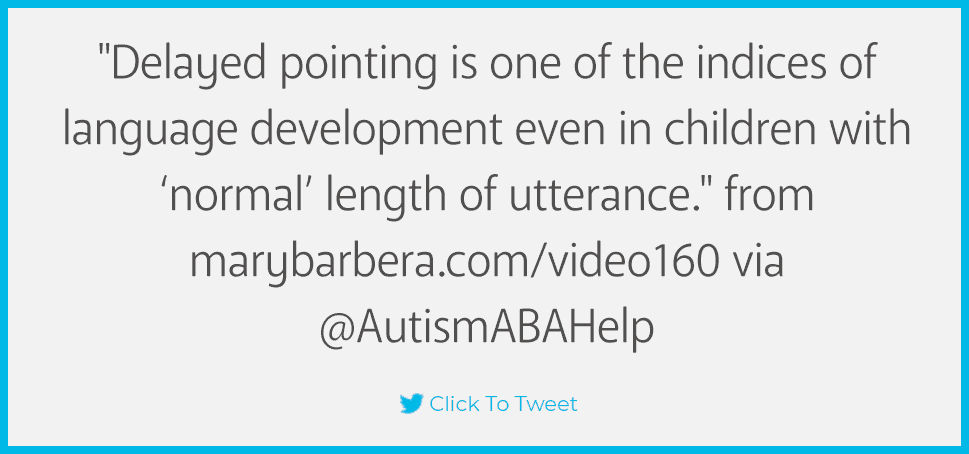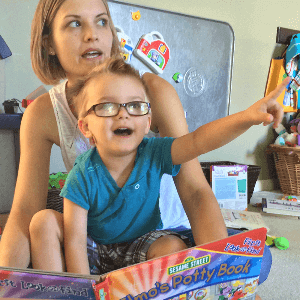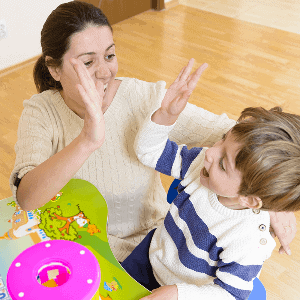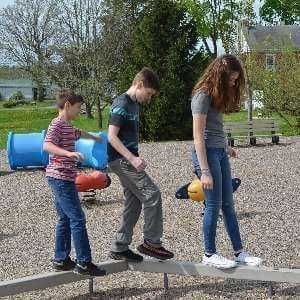Language Development Milestones in Children with Autism
Auditory Language Development Milestones
The Early Language Development Milestone Scale was published in 1980 and is still available today. The scale is used to see if the child has a speech delay, one part of a speech impairment, or a more global language issue like kids on the spectrum have. It’s a screening tool for kids up to the age of three.
There are three types of skills that the early language development milestone scale is looking at. Dr. Coplan describes the scale as an 8 1/2 by 11 piece of paper that’s divided horizontally into three areas.
The first area has to do with auditory expressive language skills. And those start with things like cooing, babbling, making single syllables, making multiple syllables, then jargoning. Jargoning is the rising and falling of syllables that are like speech, but aren’t quite speech.
The area also encompasses saying mama or dada, whether specific or not, as well as single words, two word phrases and then “cookie monster speech like “Me want cookie.” Three to five word phrases with broken English, leaving out the verb to be in conjunctions will take you from birth to about 36 months in the auditory expressive area.
Then, the second area is auditory receptive language skills. It starts with things like alerting to sound, turning to sound, turning to a bell or something else like that. And then following parents commands – initially with a gesture on the part of the parent. Like, “give me” with the parent’s hand out and then “give me” without the parents hand out.
Then following two step commands and then more complex commands. So, the auditory receptive area takes us from things like turning to sound all the way up to following two to three step commands.
Attend a FREE Workshop!
Visual Language Development Milestones
The third area is visual communications skills. Those are not often present on a language screening tool because most language tools are inherited from speech language pathologists who are about speech and receptive language. But visual skills are just as important. It starts with things like eye contact and then it moves on to things like playing games such as patty-cake and peek-a-boo and “so big,” which should come in around seven to nine months old. If you give a visual cue along with a verbal command, like “give it to me” with your hand out, that’s at a 9 month level. “Give it to me” without your hand out is at a 12 month level.
Then there is pointing. It turns out that the age at which children use their index finger to point to a desired object is virtually identical to the age at which children will use single words to name the object that they want.
This is based upon histories taken from Dr. Coplan’s research where his research assistants would ask parents the things their child is able to do at a certain age. Then they looked at how the data lined up. The index finger pointing lined up almost identically to the use of a single word. Delayed pointing is actually one of the indices of language development.[/vc_column_text]

Help With Language Development Milestones
Because I’ve been trained in the STAT, which is a Screening Tool for Autism in Two year olds, and the ADOS and MChat and things like that, I do a fair amount of looking at pointing and talking about pointing. That is one of the big red flags for autism. In typical kids, this skill comes in fast and furious very early on. In kids with autism, it’s almost always delayed.
If your child or client is having trouble in any of the three areas, or is delayed with pointing, consider taking one of my free workshops for personal help from me and a community of parents and professionals who are going through the exact same thing.
Attend a FREE Workshop!
Transcript
The wait list to receive an autism evaluation are getting longer every day, but there are some things you can do to get some insight on where your child or client stand while you’re waiting in line. Hi, I’m Dr. Mary Barbera, autism mom, Board Certified Behavior Analyst, online course creator and bestselling author of The Verbal Behavior Approach. Each week I provide you with some of my ideas about turning autism around so if you haven’t subscribed to my YouTube channel you can do that now. Today I’m sharing a small excerpt from a podcast episode I did with developmental pediatrician, Dr. James Coplan, who was the developmental pediatrician who diagnosed Lucas in 1999. In this excerpt, Dr. Coplan is discussing his early language milestones development scale. If you want to check out the full podcast episode, you can go to marybarbera.com/35 or click on the card on the screen.
The early language milestone scale, you had told me before we started recording, um, was published in 1980 and is still available at pro ed and we’ll link that in the show notes. Um, but you were explaining how, um, which I think is really good. This, this scale was, was basically, um, to see if the child had just a speech delay, one part of a speech, um, impairment or a more global language issue like kids on the spectrum have. Um, and it’s, it’s a screening tool for, uh, for kids up to the age of three. Um, can you describe just briefly the three types of the skills that that early language milestone scale is looking at?
Sure. So the scale, and I don’t have a copy in front of me, but it’s a eight and a half by 11 piece of paper that’s divided horizontally into three areas. The first area has to do with auditory expressive language skills. And those start with things like cooing, babbling, making single syllables, making multiple syllables and jargoning which is da, da, da, da, rising and falling syllables that are like speech and then mama or dada, whether specific or not. And then moving on to single words, two word phrases and then what I call cookie monster speech. Me want cookie kind of three to five word phrases with broken English, leaving out the verb to be in conjunctions. And that takes you from birth to about 36 months in the expressive area for auditory receptive, which is the middle area of the page, the middle horizontal bar.
It starts with things like alerting to sound, turning to sound, turning to a bell or something else like that. And then following parents commands initially with a gesture on the part of the parent, like give me with the parents hand out and then give me without the parents handout like that. And um, then following two step commands and then more complex commands. So again, that takes us from birth through about five. So the auditory expressive area takes us from, I’m sorry, the auditory receptive area takes us from things like turning to sound all the way up to following two to three step commands. Now, the third area, and I’m particularly pleased with this that I included is visual communication skills.
And those are not often present on a language screening tool because most language tools, um, are inherited from speech language pathologists who are about speech and receptive language. But visual is just as important. So it starts with things like eye contact and then it moves on to things like playing gesture games like paddy cake, peek-a-boo, and so big, which should come in around seven to nine months old, imitating gestures. As I said earlier, if you give a visual cue along with a verbal command, give it to me with your hand out, that’s at nine month level. Give it to me without your hand out is at a 12 month level. And then it gets to things like pointing. And it turns out that the age at which children use index finger pointing to point to a desired object is virtually identical to the age which children will use single words to name the object that they want. This is based upon histories taken from parents where my, our research assistants would ask as your child do this, does your child do that? And then we looked at how the data lined up and index finger pointing lined up virtually identically to within a couple of weeks of the use of a first single word. So delayed pointing is one of those indices of language development even in a child who may have quote normal unquote length of utterance if there echolalics and phrases.
Yeah. And I think, um, because I, I’ve been trained in the STAT which is a screening tool for autism and two year olds and the ADOS and um, the M CHAT and things like that like I do do a fair amount of looking at pointing and talking about pointing and the, you know, that is one of the big, big, uh, red flags for autism is lack of pointing um, which in typical kids comes in fast and furious, uh, very early on. And with kids with autism, it’s almost always delayed. I hope you enjoyed this short snippet from the podcast. If want more content, check out the podcast at marybarbera.com/podcast. Wherever you’re watching this, I’d love it if you would leave me a comment, give me a thumbs up, share this video with others who may benefit, and for more information, you can attend a free online workshop at marybarbera.com /workshop and I’ll see you right here next week.






